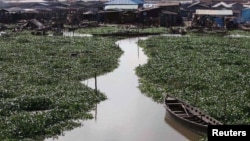ABUJA -- As world leaders prepare for the U.N.'s upcoming sustainable development conference in Rio De Janeiro, Brazil, Nigerian youth groups say they want to see the emergence of policies that help the country adapt to climate change and create jobs, and allow for their voices to be included in decision-making on the environment.
In an Abuja park, Unico Kalu, coordinator for the Nigerian Youth Climate Action Network, gathers local children to tell them why they need to participate in protecting the environment.
Warning that parts of the country have already been engulfed by the Sahara Desert, and that climate change may one day impact every aspect of life in Nigeria, he puts the message in words they can understand.
“Climate change is when you want to go to school. Your mommy tells you, ‘stand up, go to school.’ And you come back. The sun is too much," he says. "You are home, you say, ‘Mommy, the sun is too much.’ That is part of climate change.”
Kalu says his group worries that next month's United Nations sustainable development conference in Brazil will produce policies without action, or worse, policies that end up being unfair to countries like Nigeria, where more than half the population lacks basic needs, like adequate health care, shelter, and food.
"We want the decision in Rio that is favorable to us as young people and, secondly, as a country," he says. "Nigeria is a developing country. We don’t want any kind of arrangement or any kind of agreement that is going to jeopardize our country."
His organization is pushing for youth participation in next month’s conference, and Abuja's government delegation to Brazil, he says, should bring youth activist representatives.
Abdulazeez Musa of the international aid group Oxfam, says climate change is already damaging Nigeria’s land, health and security, and that government institutions set up to deal with the issues are insufficient and lack the capacity to help people to adapt.
Sustainable development projects, he adds, could help create jobs.
"There [are] also a lot of opportunities in climate change -- both for our government and individuals in terms of entrepreneurship [and] creating business," he says. "So I think it’s high time for our government to recognize that this is a huge issue."
Rio +20, the United Nations Conference on Sustainable Development, June 20-22, will to bring thousands of leaders in government, business, and non-government organizations to create policies that attempt to “reduce poverty, advance social equity and ensure environmental protection.”
In an Abuja park, Unico Kalu, coordinator for the Nigerian Youth Climate Action Network, gathers local children to tell them why they need to participate in protecting the environment.
Warning that parts of the country have already been engulfed by the Sahara Desert, and that climate change may one day impact every aspect of life in Nigeria, he puts the message in words they can understand.
“Climate change is when you want to go to school. Your mommy tells you, ‘stand up, go to school.’ And you come back. The sun is too much," he says. "You are home, you say, ‘Mommy, the sun is too much.’ That is part of climate change.”
Kalu says his group worries that next month's United Nations sustainable development conference in Brazil will produce policies without action, or worse, policies that end up being unfair to countries like Nigeria, where more than half the population lacks basic needs, like adequate health care, shelter, and food.
"We want the decision in Rio that is favorable to us as young people and, secondly, as a country," he says. "Nigeria is a developing country. We don’t want any kind of arrangement or any kind of agreement that is going to jeopardize our country."
His organization is pushing for youth participation in next month’s conference, and Abuja's government delegation to Brazil, he says, should bring youth activist representatives.
Abdulazeez Musa of the international aid group Oxfam, says climate change is already damaging Nigeria’s land, health and security, and that government institutions set up to deal with the issues are insufficient and lack the capacity to help people to adapt.
Sustainable development projects, he adds, could help create jobs.
"There [are] also a lot of opportunities in climate change -- both for our government and individuals in terms of entrepreneurship [and] creating business," he says. "So I think it’s high time for our government to recognize that this is a huge issue."
Rio +20, the United Nations Conference on Sustainable Development, June 20-22, will to bring thousands of leaders in government, business, and non-government organizations to create policies that attempt to “reduce poverty, advance social equity and ensure environmental protection.”





